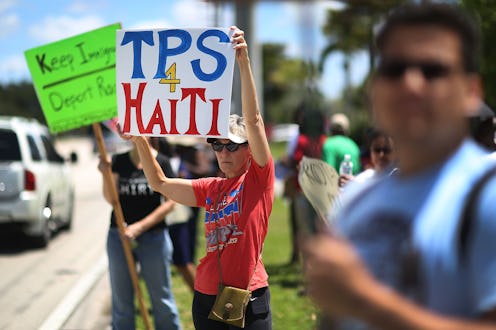
On Monday, Donald Trump's administration announced that it will no longer provide Temporary Protected Status (TPS) to immigrants from certain countries. Citizens of officially-specified foreign citizenships — who have been displaced from their countries due to a variety of oft-tense and dangerous reasons — are expected to leave the United States in the not-so-distant future. For nearly 60,000 Haitians, that date is sometime in 2019.
So, what exactly is Temporary Protected Status? As part of the Immigration Act of 1990, TPS was used to refer to the immigration status of certain foreigners in the country. In 1990, eligibility for appearing in the TPS list was determined by the Attorney General who evaluated if the country's conditions necessitated a TPS entry into the United States. However, as of October, 2017, the power of assessment and decision was handed to the Secretary of Homeland Security.
"Certain foreigners" is key here as TPS only extends to those fleeing countries where "extraordinary" and "temporary" conditions have made life too precarious and dangerous. As it stands, the current TPS provision is for citizens of El Salvador, Haiti, Honduras, Somalia, Nepal, Yemen, Syria, Sudan, and South Sudan.
With the current administration's decision to suspend TPS protection for Haitians, thousands of Haiti citizens currently in the United States could be exposed to their country's extreme food insecurity by being forced to return. According to a United Nations report published in The Miami Herald, Haiti's endemic food crop losses are at an overwhelming 70 percent while mass deforestation is one of the main reasons behind the country's destabilized agriculture industry.
In such perilous conditions, some observers think the suspension of TPS for Haitians could harm the safety of thousands. Among those opposing Trump's gutting of TPS for Haitians is Florida Sen. Marco Rubio who wrote in The Miami Herald on Nov. 17, "If TPS is not extended, Haitians sent home will face dire conditions, including lack of housing, inadequate health services, and low prospects for employment. Failure to renew the TPS designation will weaken Haiti’s economy and impede its ability to recover completely and improve its security."
According to The Washington Post, a spokesperson authorized to inform media about the Monday announcement said that the acting Department of Homeland Security Secretary Elaine Duke justified the decision to suspend TPS with research and had "assessed overall that extraordinary temporary conditions" had improved enough for Haitians to return. But according to a World Bank study, poverty in rural communities of Haiti remain high with only 11 percent of village locals having access to electricity.
Haitians are joined by Salvadorans and Hondurans who have witnessed similarly distressing updates from the Trump administration. According to The Journal On Migration And Human Security of July 2017, almost 200,000 Salvadorans will see their TPS expire in March 2018, while nearly 57,000 Hondurans, almost 9,000 Nepalese immigrants, and around 5,800 Syrians are also expected to leave in the next year or so. In spite of Duke's purported research, reports of El Salvador's civil war and the grisly Syrian war casualties remain constant whereas infrastructural damage caused by the devastating Nepalese earthquake in 2015 has yet to be adequately covered by the state.
Although the official for Duke claimed that research backed the administration's decision, some observers find it hard to believe and suspect that xenophobia could have been a leading factor in Monday's decision. Yanira Arias, a campaign manager for Alianza Americas, expressed disbelief to NPR regarding the DHS' research and said, "This is about politics and most of all, it's part of a racist and xenophobic agenda of this administration." Of course, the Trump administration maintains that its decision is based on research — not xenophobia or politics.